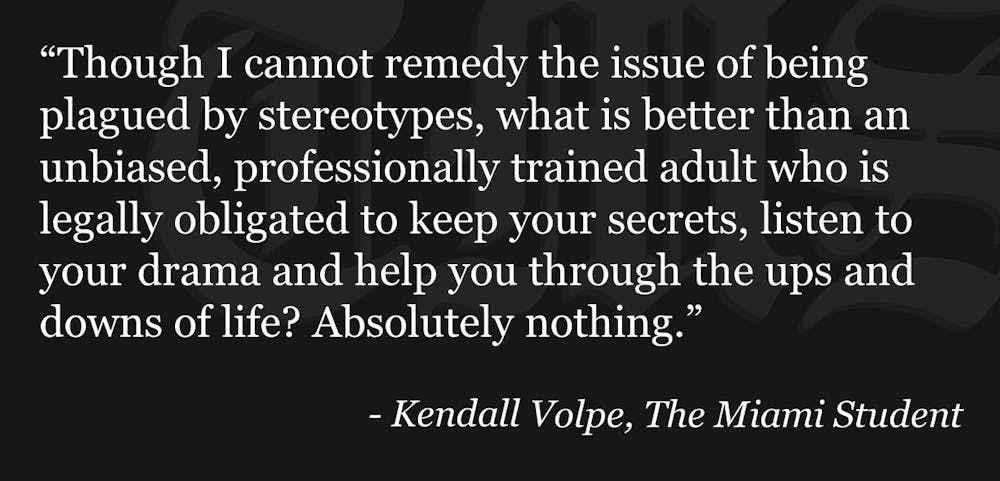Therapy is awesome. In fact, I think therapy is cool. Colloquially, people say, “Oh, xyz is the coolest thing since sliced bread.” I just wish everyone thought the way I did, because therapy really is the best thing around since Wonder Bread debuted its sliced loaf in 1930.
Alas, people somehow aren’t seeing what I am, which leads to the problem we are facing: stigmas. It’s no secret we live in a world with a longstanding history and presence of negative stigma toward mental health and mental health awareness.
Until the ’60s, mental health was not openly discussed, let alone made the face of movements regarding recognition and awareness.
Because of this, there are assumptions and stereotypes that come with candidly talking about mental health or going to therapy. A common assumption I hear all the time is that there needs to be something wrong for somebody to go to therapy. Or, worse, that people who elect to go to therapy are messed up or not normal. For these reasons and more, people are ashamed to ask for help.
Experts have reported that going to therapy increases feelings of empowerment and allows for practice of long term self-reflection and awareness. Marian Margulies, a psychologist in New York City, was quoted in a Forbes article as saying, “If you’re not getting to the cause of the pain, you’re essentially chained to the past. Psychotherapy gets to the root.” Not only that, but going to therapy gives patients the opportunity to explore their thoughts, expectations, feelings and worries without judgement, which ultimately promotes better communication in other areas of life.
What is so misunderstood about therapy is that there does not need to be any element of mental health involved. I know plenty of people who see therapists just to have life check-ins; How are things going? How is the family? How is work or school? Having someone to talk to on a regular or semi-regular basis who keeps us in check is so important, especially if that someone is outside of our usual inner circle and can provide us with a new perspective.
Therapy is what you make of it. If your session is a heart-to-heart that clears your mind and lifts weight off your shoulders, so be it. If it’s all about the gossip of others, so be it. If you feel like talking about struggles at home, work or with your significant other, so be it. Maybe it’s all about what TV show you’re most interested in, or what books you’ve read recently … so be it!
This is why I think therapy is so amazing. Because each time you meet with your therapist, it can be something the same or something completely new, and it is all so individualized and personable. You can do as much or as little as you want, and the results are what you make of them.
With all of that being said, of course there can also be a mental health component. I also know plenty of people who see therapists to help with issues related to anxiety and/or depression to work on coping mechanisms, habits that they want to see changed, or improvement of day-to-day experiences in relationships and activities.
With so many obvious benefits to seeing a therapist, why are so many hesitant to make the jump? For some, it can be lack of financial resources, awareness, or readiness to admit to wanting to talk to someone. For others, it may just be clouded judgement due to reading into stereotypes and negative associations with therapy as a whole. Fortunately, I have solutions for three of those situations.
In terms of financial resources and awareness, most universities employ counselors and licensed professionals who have to follow the same legal obligations as any who stand alone in private practice for students who seek counseling or one-on-one sessions of talk therapy. Due to COVID-19, the mental health resources available through the university are currently all remote, but students are still presented options for support.
Tele Appointments can be made available by calling this number (513) 529-4634, and if you are looking for something more informal and convenient, follow this link to Campus Care, a drop-in mental health resource where students can speak to licensed professionals with no wait time and no fee.
Enjoy what you're reading?
Signup for our newsletter
Not only that, but some health insurance companies cover therapy appointments as part of their plans, and places of work have resources available under their individual contracts, as well. In more immediate situations, there are ways to access talk therapy through reliable websites and hotline numbers that you can call.
Though I cannot remedy the issue of being plagued by stereotypes, what is better than an unbiased, professionally trained adult who is legally obligated to keep your secrets, listen to your drama and help you through the ups and downs of life? Absolutely nothing.
As someone who has been going to therapy consistently for about eight years now, I would like to officially have it on the record that I think everyone should have a therapist.
@KendallVolpe




